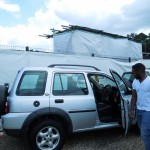The Power Africa Initiative, in which US President Barack Obama’s administration has committed $7 billion, is gaining momentum, as Standard Bank Group, Africa’s largest lender by assets, renewed its own commitment to the multi-stakeholder project.
It aims to double access to power in Africa, significantly accelerating investment in the sector over the next five years by adding more than 10,000 megawatts of cleaner, more efficient electricity generating capacity.
In the process, the project will electrify at least 20 million new households and commercial entities with on-grid, mini-grid, and off-grid solutions.
The six initial partner countries – Ethiopia, Ghana, Kenya, Liberia, Nigeria and Tanzania – have set ambitious goals to boost their power generating capacity with the ultimate aim of enhancing energy security, decreasing poverty and fostering economic growth.
The Ghana Power Compact (GPC) is the largest US government transaction to date under the Power Africa banner. The GPC takes a system-wide approach to Ghana’s energy challenges with six projects across three areas: distribution, generation and access to energy.
The GPC also supports Ghana’s efforts to mitigate climate change by funding major energy-efficiency initiatives and improving the investment climate for renewable energy. At the heart of the GPC is a strong commitment from the government of Ghana to change the laws and regulations needed to transform its power sector and put it on a path to profitability and sustainability.
The Millennium Challenge Corporation (MCC) will invest up to $498 million over the next five years, to support the transformation of Ghana’s energy sector, helping the country provide a safe, reliable source of power to households and businesses. The Ghanaian government will contribute an additional $37 million, bringing the total investment to $535 million. This initial investment is expected to attract at least $4.6 billion in additional private sector energy investment and activity from American firms in the coming years.
“Ghana is one of Africa’s most dynamic and exciting economies and the GPC will make a significant contribution towards putting the country on a sustainable long-term economic growth path,” said Sim Tshabalala, Chief Executive of Standard Bank Group.
“Standard Bank will use its presence in Ghana and the rest of the continent to further support the Power Africa Initiative as well as other power projects across the continent.”
He said of the project in general: “We are seeing an increasing pipeline of power projects across sub-Saharan Africa
“In 2013 we committed to arrange funding of at least $150 million of debt in the near term across the Power Africa countries, while more recently that amount has risen to over $400m, principally in Kenya and Nigeria, with smaller transactions in Ghana and Tanzania.”
Standard Bank is using its extensive balance sheet and on-the-ground presence across 20 markets across sub Saharan Africa to help finance projects under the Power Africa initiative while at the same time actively leading the policy reform process required to facilitate increased private sector investment in Africa’s power sector.
The bank expects more than $1 billion in commercial projects in the six Power Africa partner countries by 2018, and as much as $5 billion when the rest of sub-Saharan Africa is included.
“Standard Bank will strive to arrange or underwrite at least half of the debt required for these projects,” said Mr. Tshabalala.
“As such, our commitment to Power Africa is to help fund an additional $600m of debt in the Power Africa countries through 2018, taking our total since joining the initiative a year ago to $1bn, and another $2 billion across the rest of sub-Saharan Africa over the same timescale.”
During the US-Africa Leaders Summit in Washington earlier this week Standard Bank and General Electric reaffirmed their commitment to Africa at a power financing roundtable.
The partnership sees both parties aiming to bridge the power financing gap in Africa and formed part of the Summit, the largest gathering of African heads of state and government as well as key stakeholders to visit Washington on any one occasion.
The strategic partnership has already seen both companies commit to a $350 million financing agreement aimed at improving access to power infrastructure in Africa. Africa needs to add another 300 gigawatts (GW) of power generating capacity over the next 15 years in order to meet demand, which is expected to grow at an average annual rate of three per cent over the next two decades.
According to the International Energy Agency, sub-Saharan Africa requires more than $300 billion in investment to achieve universal electricity access by 2030.
Mr. Tshabalala said solutions to meet Africa’s growing energy demands would only be possible once developers, governments and funders reached a common understanding of the risks, pricing and regulatory imperatives needed to facilitate the required investment.
“There are significant opportunities and a viable investment case for governments across Africa to provide the lion’s share of long tenor debt funding given the solid returns on investments in power generation and distribution,” he said.
“Standard Bank works with investors to offer them a sustainable and structured model to finance power and infrastructure projects appropriately. On-going strategic partnerships with stakeholders like GE, allows us the opportunity to provide access to energy across the continent.
“In tandem, we are also playing an active role in supporting the policy reform process that should facilitate additional private sector investment in power.”
Africa’s inadequate power infrastructure is a serious constraint to sustained growth and creates significant transaction costs for firms operating on the continent, which is home to 15 per cent of the world’s population yet produces just three per cent of the its energy output.
Decades of inadequate investment in infrastructure along with a lack of policy clarity and poor planning by regional governments means that many sub-Saharan African countries continue to battle inadequate power supply.
Power outages cost more than five per cent of gross domestic product (GDP) in Malawi, Uganda and South Africa; and between one and five per cent of GDP in Senegal, Kenya and Tanzania.
While the continent has seen heavy investment in the natural resource sector, global investors are quickly realising the potential benefits of investments in other sectors such as power and infrastructure. Financial institutions such as Standard Bank are pioneering innovative funding solutions to help close the energy gap on the continent.
“Standard Bank’s view is that there are many financing options on the table, if the economic opportunity is considered seriously,” said Mr. Tshabalala. “For example, new generation planning requires a complete financial model.
“Critical to success is the need for greater certainty in terms of creating environments conducive to investment which then makes it easier to attract the required investment into the sector, especially within emerging markets.”
He warned however, that in terms of pricing, there were still many hurdles to overcome.
One example is where power tariffs are set below the replacement cost of production, which then acts as a disincentive to investment in new plants.
“The bottom line is that African governments need to take these harsh economic realities into consideration and advance sector reforms,” said Mr. Tshabalala.
“Only then will they boost their access to capital markets and better position themselves to fund the large-scale power developments that are crucial to their economic futures.”
Comments are closed.






